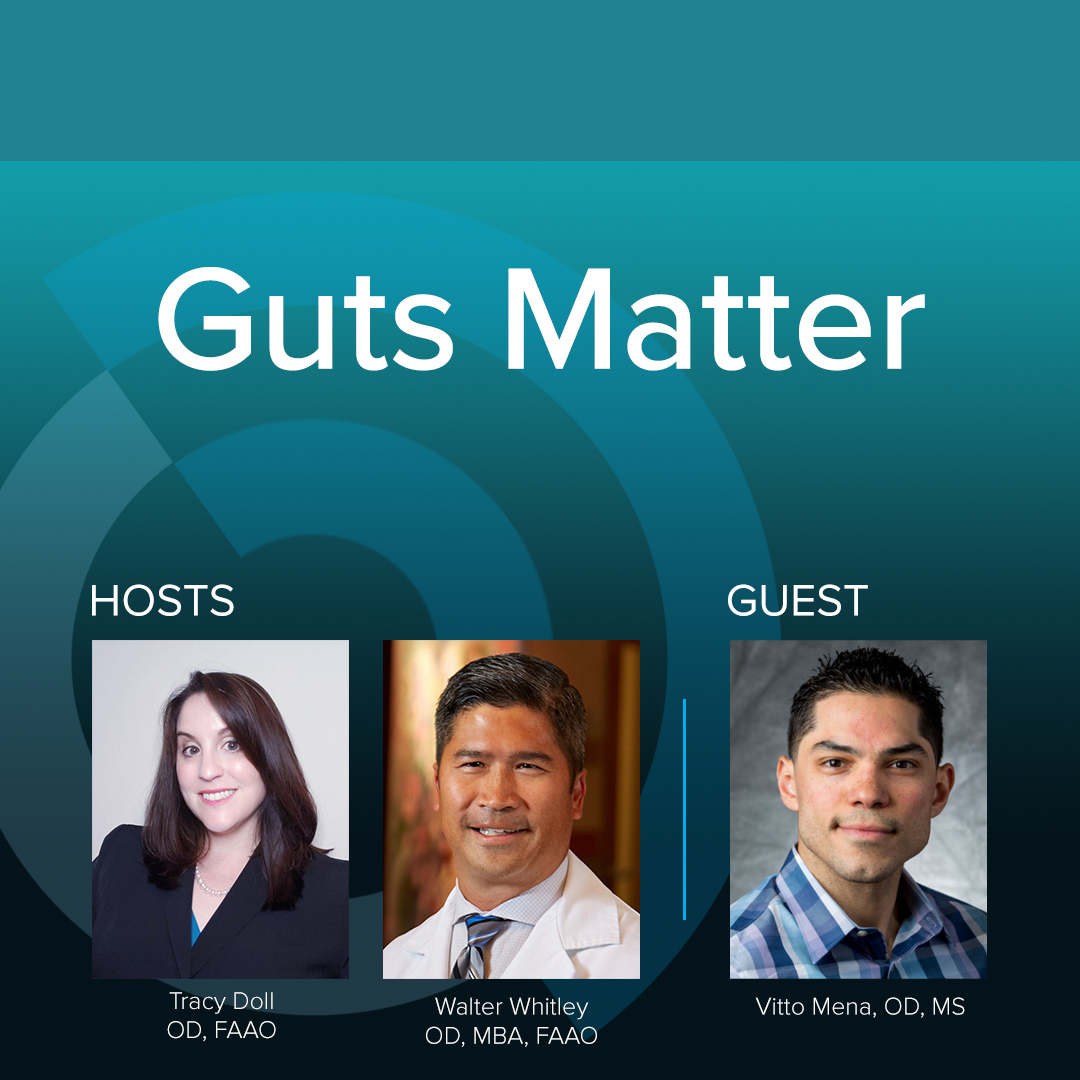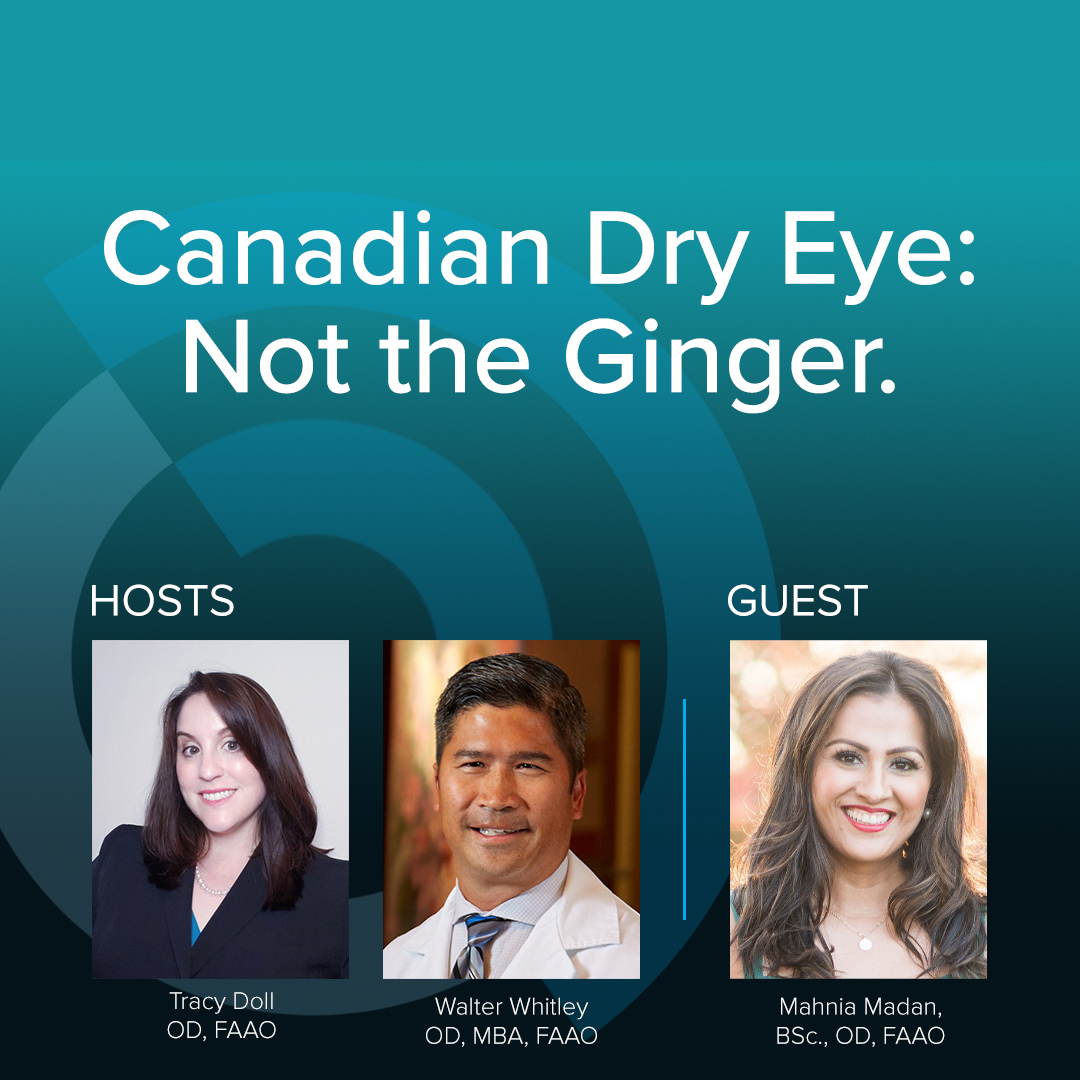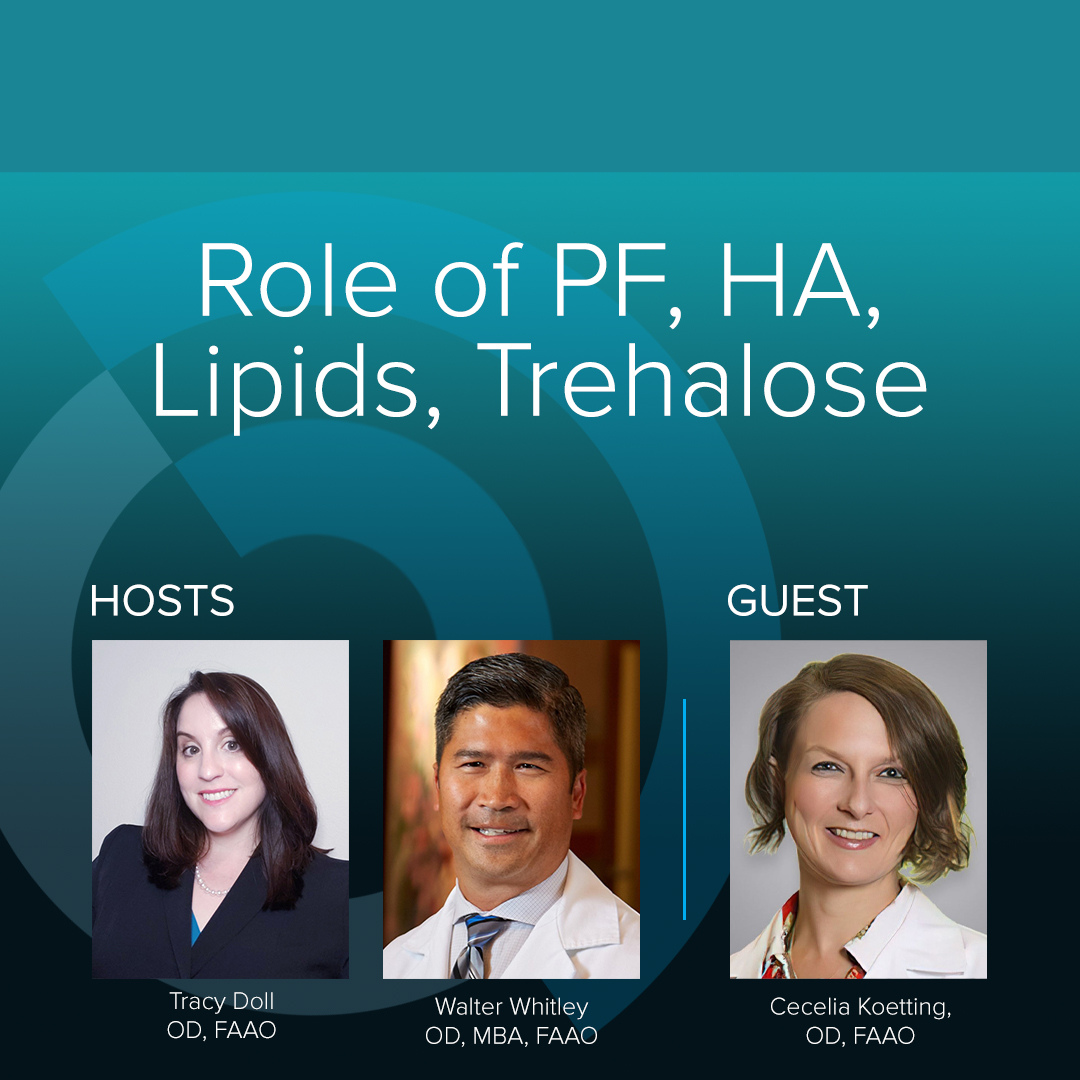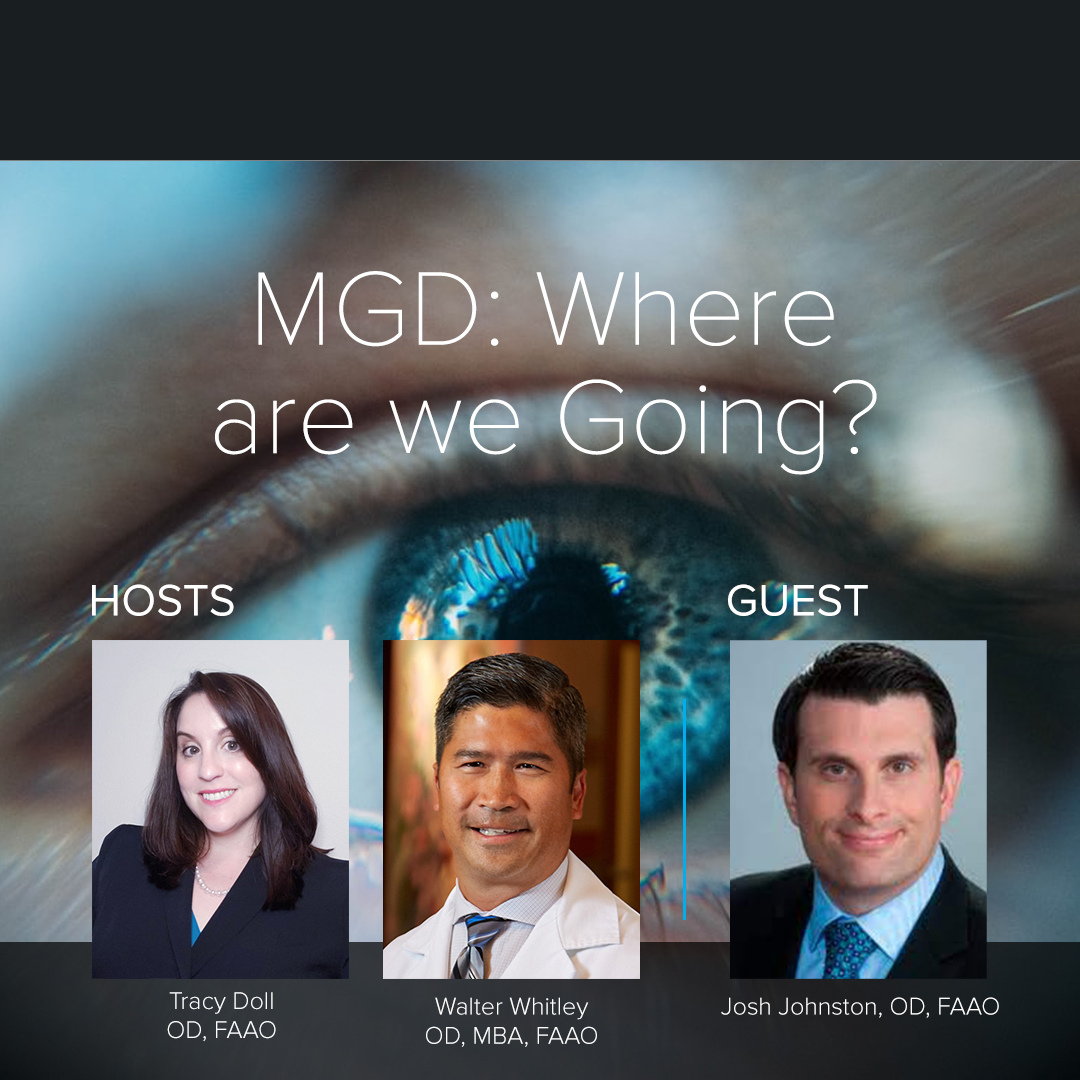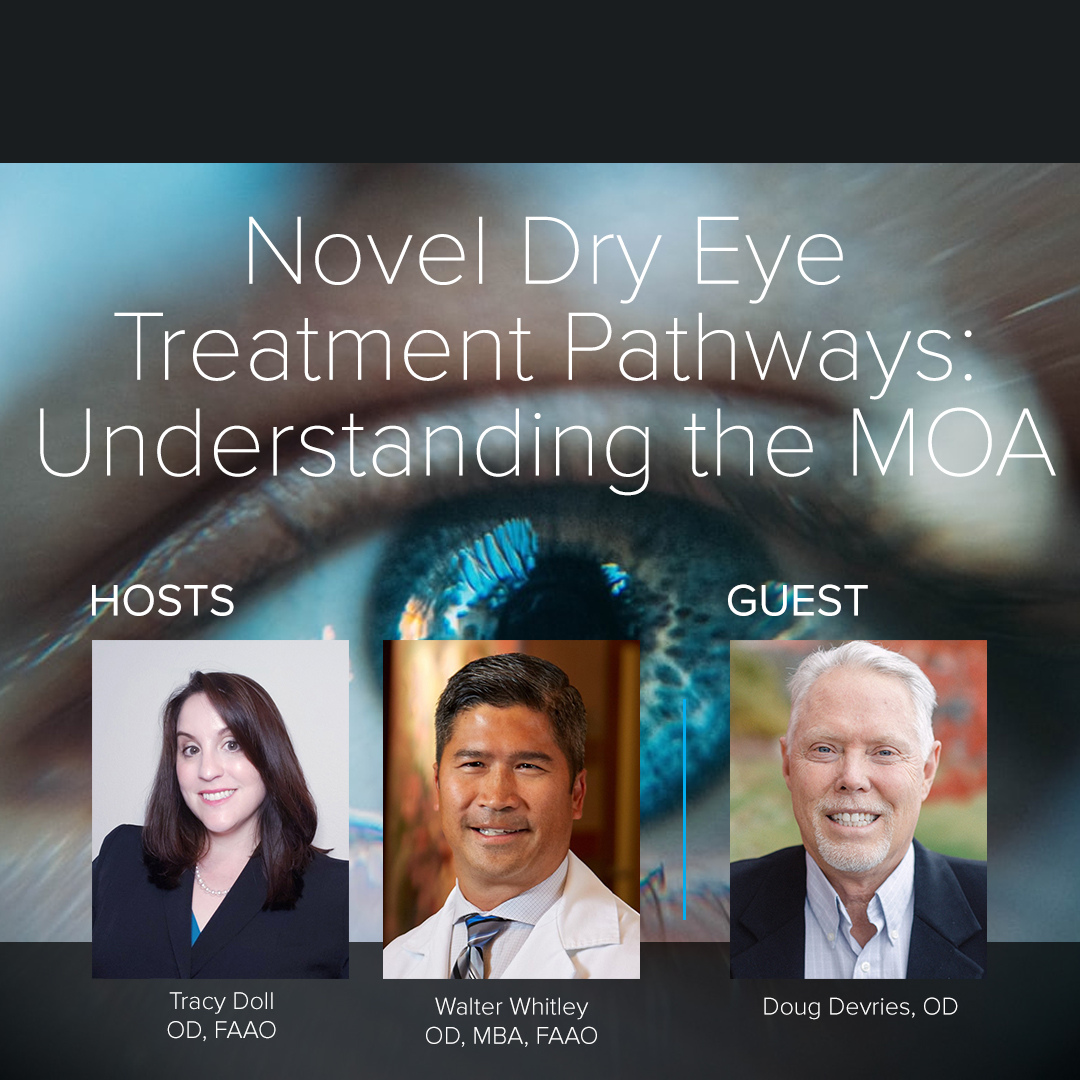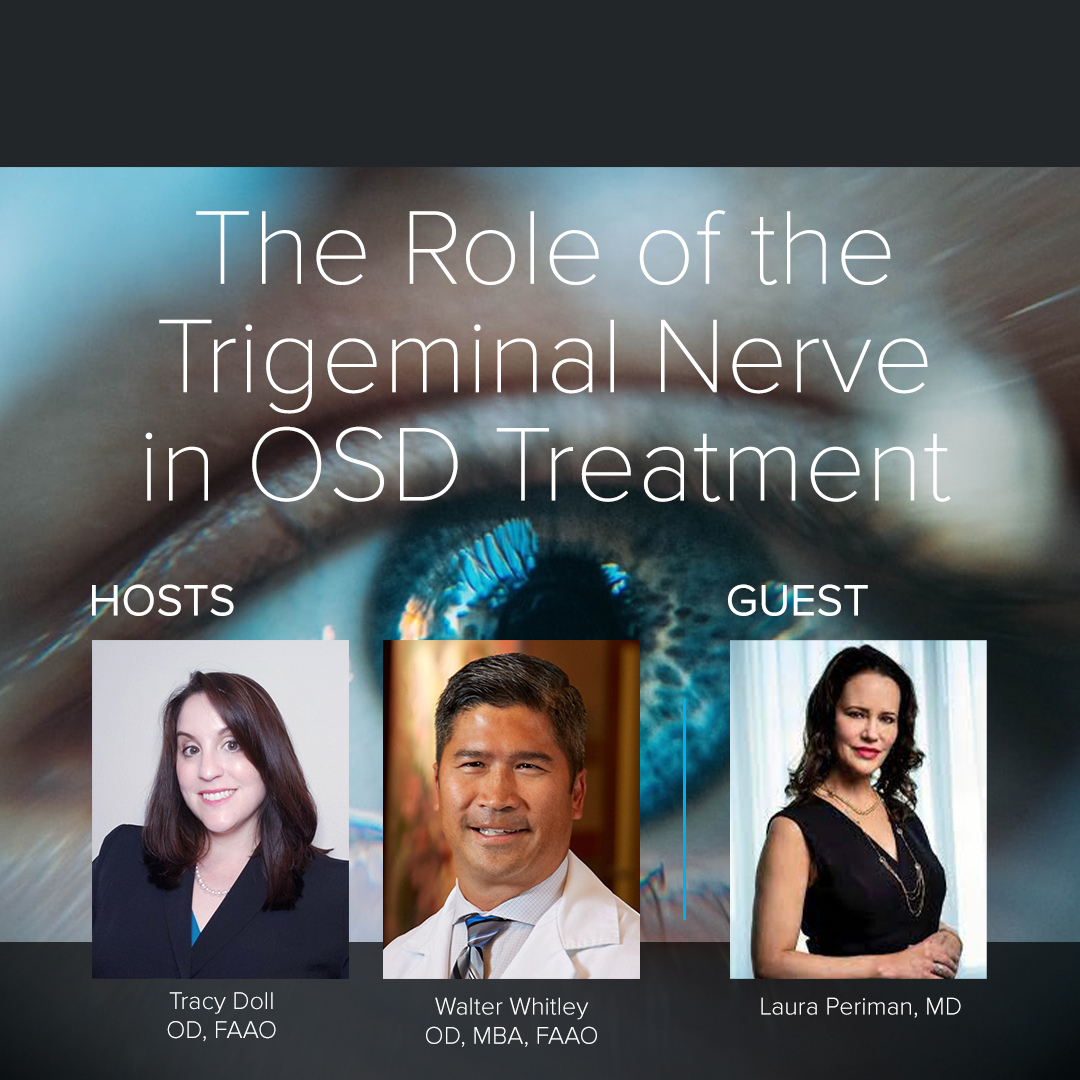Episode Transcript
[00:00:00] Speaker A: Welcome to the Dry Eye podcast series. Click on dry Eye, your insider paths to the most exclusive dry eye topics. The series will raise awareness about the current and future state of ocular surface disease. The podcasts will focus on a variety of topics. Before we get to our next episode, here's a quick word from our sponsor. In today's episode, we have the one and only Vitomena od from the optical Academy in Clifton, New Jersey. Welcome, Vito.
[00:00:28] Speaker B: All right. Thank you so much for having me. It's gonna be a blast. I hope it will.
[00:00:33] Speaker C: It will. We're glad to hear there.
[00:00:35] Speaker A: Vita, tell us more about your practice modality. Where are you and how are you practicing?
[00:00:40] Speaker B: Sure. Yeah. So I practice an optical academy that's located in Clifton, New Jersey. I would say that's about ten minutes from New York City or so. And so I'm the sports vision director for that. And so I work really closely with the NJEA, which is the New Jersey Education association, which is the largest education association in the entire country. And we also work with the Department of the New York City Department of Education as well. And so all those numbers that you see that children fail, those 25 percentages of children need glasses, those numbers are dead on accurate. So I'm constantly in the school systems. I'm doing a clinical skills lab, bringing the equipment inside the building, and doing eye exams. And so it's really the tripod effect, because you're dealing with the children.
The teachers are the ones, obviously, teaching the kids. They got the parents, and then the parents have the grandparents. So it's really that tripod effect that really bring home that comprehensive eye exam to everybody and spread the message to as many people as we can.
[00:01:35] Speaker C: Hey, dude, I want to say kudos to you for all your hard work. I know you're involved with AOA, the sports vision. I know you had the public service award a couple years ago from Salus University and the young od of the year and most photographs at any conference ever from the doctor.
[00:01:54] Speaker B: Yes, that is true. Yeah. So thank. I appreciate the AOA for putting me onto the sports vision performance section. That was very nice of them. So I'm on their board, and so I went to Seton Hall University, and so I actually have a master's degree in microbiology. And so just thinking about the athletic components. Well, what's the athletics need to worry about as well? Well, nutrition. Right. And so that's why I have an interest in the nutrition side of things and kind of like what we're going to talk about today in today's discussion on how it relates to dryness and just inflammation in general.
[00:02:26] Speaker A: So dry in sports vision. You mean those two things can go together? That's amazing.
[00:02:31] Speaker C: Yeah, for sure.
[00:02:32] Speaker B: You know, because if your eyes are dry, I can mess with your contrast, sensitivity and all that stuff. So, remember, it's all about timing and reaction timing. And that's what can differentiate a great athlete from an elite one. So that's why, you know, the eyes are very important. 80% of our visual system is done through that, and so it needs to be at its highest level possible.
[00:02:49] Speaker C: So what sports did you play growing up?
Nothing to do with our talk.
[00:02:54] Speaker B: No, no, that's fine. Yeah. So, yeah, so I played basketball and baseball. I was better at baseball, but I liked basketball more. And so when I went to Seton hall to d one school, I actually tried out for their team. I try to walk on, and so. And long story short, they red shirted me, and I just became like, a. An assistant manager as a student. And then I just. After that, I couldn't keep up with it. I guess I wasn't smart enough with science and sports, so I stopped after my freshman year. But baseball is really where I like to hone in on more anything.
[00:03:24] Speaker A: How about you? Waltz. What'd you do?
[00:03:26] Speaker C: I play baseball and football, but I have the least amount of talent that's anyone in my family. So thankfully, my kids are good and my brothers are really good.
[00:03:36] Speaker A: I was a swimmer, so that's how I.
[00:03:38] Speaker B: It's good. It's good.
[00:03:39] Speaker C: Aerobic exercise.
[00:03:40] Speaker B: That's awesome. There you go.
[00:03:41] Speaker A: That's how I put myself through college, teaching those swimming lessons. But getting back to our topic, let's.
[00:03:47] Speaker C: Get back to this gut.
[00:03:49] Speaker A: Get back to the gut. It's so important.
[00:03:51] Speaker C: What is? Gut dysbiosis.
[00:03:54] Speaker B: Yeah. So, well, the important thing is, like, usually when I do a lecture, I usually tell people that our gut and our brain are actually connected together. And so usually I'll start off the lecture saying that, you know how the saying goes, you are what you eat. You really are nothing. You are what you eat. You are what the thing that you are eating has eaten, because the things that they've eaten are going inside our bodies, right? So whether that's antibiotics or, you know, the pesticides or the herbicides that are inside the grounds. And so now the biggest thing now is the foods that we're eating now are not the same that they were in the thirties, forties, and fifties growing up, because now agriculture is now a business, and so they're giving pesticides, they're giving corn and soy to the animals and they're trying to get them fatter. And so what's happening is if the antibiotics are trying to make these animals bigger and bigger and bigger, and then they slaughter them and then we eat them, well, that's making us bigger and bigger and bigger, and we're going to be slaughtered soon. What, to cancer? To inflammation and all that stuff. So all the oxygen and calories that we eat, it's energy for ourselves, right? So 90% of our entire body, 90% of all our cells are actually bacterial. 10% of them are actually human genes, right? So going back to that human or the gut to brain connection, serotonin and melatonin. Serotonin. 90% of serotonin is actually found in our gut. 70% of melatonin is actually found in our gut. The rest is located in the brain. And so a lot of people think that our brain is the powerhouse center. It's really the gut that drives everything. Because what happens is, if our gut is not cooperating, it's going to lead to inflammation and also oxidation. And so usually what I'll try to tell clients or patients is that oxidation, think of it like if you were to cut an Apple in half, and when the apple starts to turn brown, that's oxidation that's happening in our bodies. It's like rusting inside our bodies. And so the biggest bacteria that we have in our body, that's the most important is actually mitochondria. Mitochondria, the ATP of our bodies, that creates that energy. It's really engulfed Bacteria. Whenever you're eating Sugar and all these things, it's actually poisonous to our mitochondria, and it causes all of these things to occur.
Going back to our gut, we need to eat. I like to say this Analogy, or d I n e, which is dying, we got to eat when we go out. So these represents our digestive system. The eyes are immune, n is our nervous system, and then e is the endocrine system. The digestive one is actually the most important one because it's what delivers most of our vitamins, our minerals, our polyphenols, our hormones and our proteins.
And so we need all those reactions happening inside our body, because if without them, we won't be able to survive. So we're really feeding our gut as much as we can, because located inside our gut, we have stem cells. And what helps keep those stem cells alive and more active is vitamin D. So going outside more contributes to that. So we really got to be protecting our bodies with. With the foods that we're eating and possibly the supplements that we're taking. So the biggest thing that I'll say is nothing hands down beats eating healthy vitamins and supplements. Think of that as an insurance policy.
[00:07:16] Speaker C: That's one of the questions you had for you is, you know, what should we do? Or what can we do to optimize our guts?
[00:07:22] Speaker B: Right? So the biggest thing is, a lot of people don't even talk about sleep, really. And so sleep is the biggest component, really, because what happens is that we need to minimize or get rid of the toxins that we get on everyday basis from outside, from the smoke, from stress, whatever, right? So when we're sleeping, we need at least 8 hours of sleep. Studies have shown that if you're getting less than 8 hours of sleep, let's say 5 hours from four days in a row, you actually become insulin resistant. And so what happens is our ghrelin and lectin levels are active when we stay up longer and longer and longer when we sleep. What it does is our cells in our brain shrink.
What that allows the brain to do is it's something called a brainwash. And so when the brainwash is being cleared out, it clears out all of the poisons that happen in our bodies. Lp's, which is lipopolysaccharides, in layman's terms, as little pieces of crap. They're like fragments of cell wall bacteria, and so that's got to be removed. Also, it minimizes amyloid buildup in your brain, and that's what can cause cognitive decline, like dementia, Alzheimer's, all these different things. So, number one is sleep. Number two is something, what's called hermetic stressors. Hermetic stressors are things like exercise, yoga, meditation.
Another thing is also calorie restriction or fasting. The reason why those are very important and those are called hermetic stressors is because they have what's called autophagy, which means that your cells recycling program. So what that means is that our cells in our body, we have good cells and bad cells. What's pretty much happening is there's a war happening inside our gut.
When you have autophagy happening, what's going to happen is your weak cells are going to die off, and the stronger ones are gonna remain there.
And so those strong ones survive. It creates that more protection of a better barrier. Right. The other big thing is we need to avoid lectins. So, lectins, what those are, those are sticky proteins that are found on all plants. So, for example, what a lectin is. If you were to grab a tomato from the supermarket, you feel like that sticky substance on a tomato. That's what's a lectin. And so the reason why plants have lectins is because lectins poison something that tries to eat it. So plants need a defense mechanism for themselves to avoid being eaten by predators.
Our protective measures in our bodies are skin, mucus, and also our stomach acid. All those things are very crucial to create more mucus in our body, to protect us, to protect our gut.
Obviously, we all know about eating two to three servings of vegetables a day, two to three servings of fish per week.
Nut consumption is actually very, very, very crucial because it increases our brain derived neurotrophic factor, which helps our brain grow. Vitamin D and B is also crucial pre and postbiotics, which we'll get into in a little bit. And the biggest one that I talk about is high quality fish oils and also polyphenols. So I know it's a lot, but the biggest one that we could all do is sleep better, exercise a little bit more. Not just me walking around, exercising, just walking around your block or going on your bike for 1020 minutes a day or something like that.
[00:10:36] Speaker A: What about probiotics? Because I do have some dry patients, and a lot of them tend to, a good portion of them actually have chronic gut issues. So irritable bowel syndrome. They have acid reflux issues. And a lot of them have asked me if probiotics are helpful. What's your take on that?
[00:10:54] Speaker B: Yeah, so for sure. So I forgot to mention, so going back to Hippocrates, back in 400 bc, he said all diseases stem from the gut. Right? Back in 1908, we have someone called Eli Metchnikov. He was a russian scientist, and he got the Nobel Prize. And he said that all, I mean, death begins in the coldest. So it goes back to the bacteria that we're having. So Eli Methnikoff was the first person to actually describe what a post, a post bio, I'm sorry, a prebiotic or a probiotic was. So first we got to just give that definition of what a probiotic is. So probiotics are the actual bugs themselves, the actual strains of bacteria. So if you think about it like watering a plant, those are the seeds that you would plant. That's what a probiotic is. A prebiotic is pretty much they're plant fibers and they act like food to help bacteria grow. And so that is, think of it like water and fertilizer for your seeds. That's what the prebiotic is. And then postbiotics is a chemical reaction that's given off once you ingest those things to eliminate more bad bacteria from getting into your body. So going back to your answer about postbiotics or probiotics is that it's very, very crucial, because when our gut is not aligned properly, we have more bad bacteria than good bacteria.
What gets rid of our bacteria? These are the three biggest culprits. Number one are nsaids. People are popping nsaids left and right. They're actually the number one biggest inflammation thing that we have. But we take it all the time to minimize anti inflammatory reactions. Number two is antibiotics. We're always prescribing antibiotics left and right. The number one, over prescribed medicine, in just medicine. Right. What happens is when you are taking an NSAid or an antibiotic, what you did was you just now ingested that it went into your stomach. You just created a bomb in your stomach. So what did that do? Well, you just got rid of the bad bacteria, which was the goal, but you actually now got rid of your good bacteria as well. So what does that mean? So, think about it. When a female were to take an antibiotic, sometimes they can get what's called the yeast infection. Now, why does that happen? Because now there's an overgrowth of candida that's overgrowing. So what happens is, whenever you prescribe an antibiotic to someone, you got to let them know. Number one, that, number two is you got to recommend that they start either supplementing either a prebiotic or a probiotic.
Have yogurt with it, kefir, sauerkraut, things like that, so that we bring good bacteria back into our system. The problem is that if our gut is not properly healed, all those vitamins and minerals that someone might be taking are not being absorbed properly. So that's where postbiotics, prebiotics and probiotics.
[00:13:39] Speaker C: Are very, very, very crucial.
[00:13:42] Speaker A: That's excellent. So do you think that prescribing antibiotics for dry disease or meibomian gland dysfunction should be a first line therapy or something that's reserved for when other options don't work?
[00:13:55] Speaker B: Right. So what happens is that we're in a microwave society. We want to make the best fix possible. Right. But remember what we taught in school? We're taught in school to find the underlying cause. Whenever we give an antibiotic, what happens? Well, we got rid of the eight, the thing that's causing the problem, but it's not getting down to the root cause of the problem. It gets rid of that problem a week or two weeks later. Right. But then it comes back again because why? The gut is messed up. So if someone wants something very quickly and get rid of it, yes, without a doubt. The problem is that when we take an antibiotic in our system, it stays in our system for at least two years.
That's the biggest issue. And so what happens is lectins. What they do is they pry apart the mucosal cells in our gut lining, and when that does, we have all of these toxins going into our system that's leading to inflammation. So going back to your question about antibiotics, we're going to prescribe it regardless, no matter what happens. But we got to tell the patient about what the side effects are and how do we implement this as much as possible to minimize those side effects from occurring and causing other problems. So we all know the homeopathic ways are warm compresses, or you might have heard patients taking, like, a tea bag and placing it on their eye. These are some of the things that I actually do. And actually, some patients actually told me that this actually works. So what I would tell patients is I would tell them to get organic apple cider vinegar. Take two teaspoons, two teaspoons of organic cider vinegar, boil it with a hot cup of water, and soak a cotton swab on it and put it on there. Apple cider vinegar has actually anti inflammatory and antifungal properties in it, and it actually helps. Like I said, some of those patients. Other times it's coconut oil. Coconut oil. What you can do is just put a little swab on a cotton ball and just put a small, little area on your lids, and that can help minimize some of the inflammation as well. Those are just some homeopathic things that can be done that just, that I've seen work.
[00:15:52] Speaker A: Coconut oil actually can remove makeup. You just have to make sure you don't overdo it all the time, or it can cause a little bit of backing up. But, yes, for sure.
[00:15:59] Speaker B: Makeup remover, without a doubt. And then sometimes with the makeup is what's causing a lot of these oily glands and all that stuff too. So.
[00:16:07] Speaker A: Agreed.
[00:16:08] Speaker C: So to be clear, are you prescribing antibiotics for dry disease? I mean, are you still using?
[00:16:13] Speaker B: Oh, for sure.
[00:16:14] Speaker C: That went away from, like, a z pack or doxycycline. Hundred milligrams, uh, once or twice a day, whatever you. You choose.
[00:16:21] Speaker B: Yeah, I mean, they. They work great. Obviously, that's why we prescribed them, because if they didn't work, we wouldn't be using them. Right. And so, you know, usually I'll be using either or keflex. One of my go to's that out that I would use, you know, for. If you have a preceptal or things like that. But I do prescribe them, but I do warn the patient, hey, if you're going to take this medicine, you need to be on some type of probiotic, or you need to be taking something with good bacteria being back in your system, because it can harm other things inside your body, because, again, we got to get down to the root cause of what's causing all these issues.
[00:16:54] Speaker C: So staying on MGD, let's say doxycycline, we've all had that patient that's been on 100 milligrams, like a year or longer.
[00:17:03] Speaker B: Yeah.
[00:17:03] Speaker C: What are your thoughts on that? Should they take them on off, put them back on?
[00:17:08] Speaker B: I mean.
[00:17:08] Speaker C: Yes, with the probiotics. What are your thoughts there? Just.
[00:17:12] Speaker B: Yeah, so if we're. The hard part is that we're not really taught on the nutrition side of things. So when we fix the actual gut lining and we restore it by either sleeping, eating, all those things, vitamins, minerals, all that stuff, those issues won't actually come up. It's what's causing it is because we have inflammation oxidation stemming from the gut. So we got to fix that first for then that to never occur again. So we got to give that in the beginning. But, like, okay, now let's find out what's really causing it. So, usually, I would recommend patients see a gastroenterologist to minimize what's called leaky gut. And that's what lectins do. They can cause something, what's called leaky gut. And so now a lot of studies are showing just not just the gut and brain, but also the gut retina axis, because that can cause, you know, uveitis or AMD. And all these things is the foods that we're eating are causing all these things to occur.
[00:18:01] Speaker C: Well, we want to stay away from the leaky gut for sure, but, you know, when it comes to the antibiotics for dry eye and MGD, oftentimes, yes, we may prescribe this, but we have to be finding the underlying cause of prescribing a heat mask, doing an MGD procedure, evacuating those glands, prescribing anti inflammatory. So they do play a role. We just love to get your insights on that. You mentioned nutraceuticals. So for dry eye, yes, we're doing omegas.
What are your thoughts there? Do you have what dosage is there?
[00:18:34] Speaker B: Yeah, I'm a big fan of high quality fish oil. So the DHA is, when it comes to dry eye symptoms, is usually the EPA that people are going are gearing towards. But when it comes to our brain and our gut, we really want that DHA component because our brain is made up of 60% of fat. So if our brain is made of 60% of fat, what do we see with. Well, obviously our brain. And so we need good quality DHA to sustain ourselves because it helps minimize cognitive decline, it helps with our oily glands, all that stuff. Right. And so a minimum of 1000 milligrams of Dhaev. Right. So when you go to a store and you see different types of supplements out there, you'll see a total of a thousand. But you look in the back of the bottle and it says EPA and DHA only have like 500. Right. And has other types of different oils. But you want at least a minimum of a thousand milligrams of DHA when it comes to a high quality fish oil, because that will help minimize some of those things that we're experiencing when it comes to MGD as well.
[00:19:29] Speaker C: Yeah. One of the things that Tracy and I, we've talked about this before is glaev and having that in the nutraceuticals because it does have great anti inflammatory properties if in the right ratio. And so that's something that I've been using. I know she has been using it as well with the hydro eye formulation. So, yeah.
Any final pearls you have when it comes to why the guts matter in dry eye?
[00:19:56] Speaker B: Well, again, it comes down to really all the sugar that we're eating, the foods that we're eating is not the same as it was in the past. So we got to be more proactive than reactive. Right. So you know how a lot of people are either going gluten free or they're eating more organic, and doesn't mean that organic is the end all, be all. The reason why you go organic is to minimize the herbicides and pesticides that are in the are in there. Right. And so that's why people are doing that, minimizing meat consumption. Because what's happening with the meat consumption is that this is what's causing most of the inflammation in our body as well. We're not consuming a lot of fish.
That's another issue. So nobody's going to care about our gut or our brain more than us. Right. And so we don't, if we don't take that proactive approach, you know, we're going to be dying sooner, you know, so medicine has kept us around longer. We were the best. We're the best country when it comes to medicine and all that stuff. But, you know, we're also sicker. We have more cancer, more diabetes than ever. Right. And it comes down to really the things that we're eating. So it really comes down to our gut because our gut is really has nine times more signaling than it goes to the brain.
And so when you have oxidation inflammation, it's going to run rampant throughout our entire bodies.
[00:21:02] Speaker A: Thank you for bringing to our attention how important it is the aspect of diet when it comes to yet another aspect of our health, which is actually ocular surface dryness.
You are such a wealth of knowledge. We really love to having you on today. And thank you for being champion for all areas of optometry and for coming on today and discussing this one little aspect of it, which is how to get our patients healthier with their bodies when it comes to dry eye.
[00:21:30] Speaker B: All right, perfect. I appreciate the time. It was a blast, like you said, and can't wait till the next one.
[00:21:34] Speaker A: Thanks for listening. Join us for our next episode soon. Here's a quick word from our sponsor.
[00:21:40] Speaker D: For over 18 years, eye Eco has been an industry leader of natural, effective, at home dry Eye management. We support you and your patients with scientifically proven products for mild, moderate and severe dry eye. Join us today at IECO.
